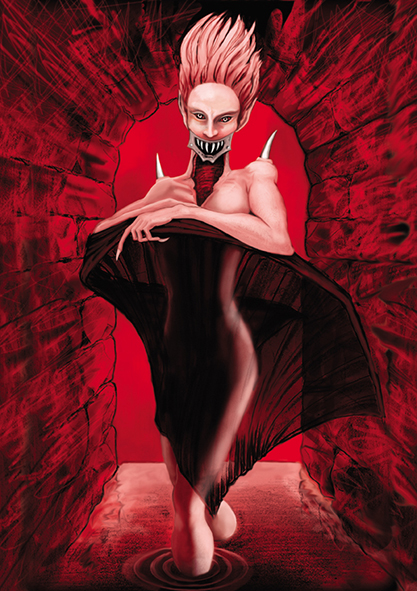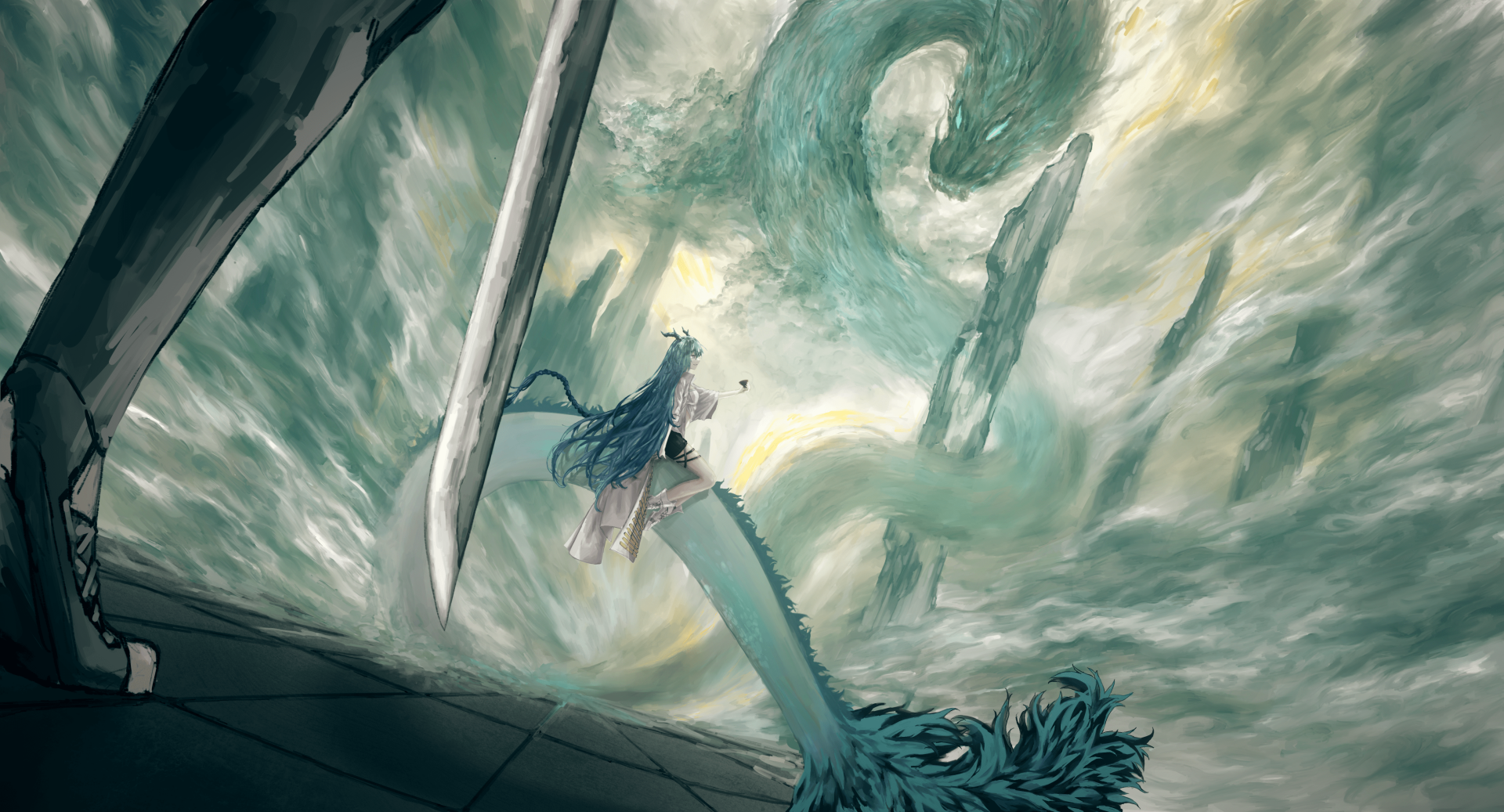"Only after one hundred days of consistent work, only then is the light genuine."
True Name - Lü Dongbin (呂洞賓)
Alias - The Son of Pure Yang (純陽子 Chungyang Zi), Patriarch Lu (呂祖 Lu Zu), The One Who Returns to the Tao (回道人 Huidao Ren), Perfected Man of Miraculous Supranormal Powers (妙通真人 Miaotong Zhenren), Perfected Lord Pure Yang Who Teaches Orthodoxy and Exhorts to Deliverance (純陽演正警化真君 Chunyang Yanzheng Jinghua Zhenjun), and Imperial Lord Pure Yang Who Teaches Deliverance and Inspires Trust in his Protection (純陽演化孚佑帝君 Chunyang Yanhua Fuyou Dijun).
Class - Saber
Gender - Male
Servant Summary
Lü Dongbin is a Chinese immortal revered as a hero of marvelous and infinite wisdom by Taoists. He was born during the Tang Dynasty in the 8th century and converted to Taoism by Zhongli Quan. Lü Dongbin is the most widely known of the Eight Immortals and hence considered by some to be the informal leader. His real name is Lü Yán (Chinese: 呂巖 or 呂岩). Dňngbīn is his courtesy name. Dňngbīn literally means "cave visitor". He called himself "Master Purely Yang" or “Pure Yang Patriarch” (Chinese: 純陽子; Pinyin: Chunyang Zi) and is called "Ancestor Lu" or "Originator Lu" (Chinese: 呂祖; Pinyin: lü zŭ) in Taoism.
He is depicted in art as being dressed as a scholar and often mounted on a tiger, the symbol of divine energy and power. Lü Dongbin carries with him a white horse-hair whisk that bestows him the power to fly through the skies and walk the clouds. Lü Dongbin is also famous for his magic charms (yellow paper with sacred writings - Fu Lu) that could ward off ghosts and demons.
His greatest source of power is the magnificent double-edged sword, called "The Pure Yang Treasure Sword" or “zhǎn yāoguŕi”. It is said the Huólóng Zhēnrén gifted him this Blade, but many others claim that Zhongli Quan handed him the Blade upon his ascension. The truth of this remains unclear.
The sword enables Lu to capture, tame, or dispel all evil spirits. It also gives him the ability to hide in the heavens and render his physique invisible to evil spirits. In truth, the Sword is a Azure Dragon known to transform into beautiful women to travel with him and is further capable of taking many forms. He is also known for having created the Heavenly Escape (Formlessness) Sword Technique which is capable of severing worldly attachments, illusions, and desires.
When he was born a fragrance allegedly filled the room. Lü Dongbin has a reputation as a womanizer and a heavy drinker, even after becoming immortal. Lü Dongbin had mastered the five elements and yin and yang, and used his powers to his advantage to sleep with many beautiful women. Eventually Lü Dongbin did attain a higher state and became enlightened however.
In the "Yijing," the "Qian Trigram" represents Heaven, associated with the element of metal, symbolizing pure yang energy; it represents the positive energy and righteousness between heaven and earth. Lü Dongbin is known as the "Pure Yang Patriarch" in Taoism, with the Taoist name "Chunyang Zi." The sword he wields is the "Pure Yang Treasure Sword," used for suppressing evil spirits and demons. Therefore, the Qian Trigram corresponds to Lü Dongbin.
Servant Biography
In Taoist tradition, the Birth Anniversary of Patriarch Lu Chunyang (呂純陽祖師聖誕 Lu Chunyang Zushi Shengdan) is celebrated on the 14th day of the 4th Chinese lunar month. Lu Chunyang, commonly known as Lü Dongbin (呂洞賓), is a prominent figure in Chinese culture, recognized as one of the renowned Eight Immortals (八仙 Baxian) in Taoism. These transcendent beings are known for their magical abilities and ability to dispel malevolent forces.
Lü Dongbin, also referred to as The Son of Pure Yang (純陽子 Chungyang Zi) and popularly known as Patriarch Lu (呂祖 Lu Zu), self-identified as The One Who Returns to the Tao (回道人 Huidao Ren). Throughout history, he has been bestowed with various honorific titles by different emperors, such as Perfected Man of Miraculous Supranormal Powers (妙通真人 Miaotong Zhenren), Perfected Lord Pure Yang Who Teaches Orthodoxy and Exhorts to Deliverance (純陽演正警化真君 Chunyang Yanzheng Jinghua Zhenjun), and Imperial Lord Pure Yang Who Teaches Deliverance and Inspires Trust in his Protection (純陽演化孚佑帝君 Chunyang Yanhua Fuyou Dijun). In the Quanzhen school of Taoism, he is regarded as one of the Five Northern Patriarchs (北五祖 Bei Wuzu).
Lü Dongbin is typically portrayed as a scholarly gentleman with a long wispy beard, carrying a sword on his back to ward off evil forces. Renowned for his demon-slaying abilities, his thrown sword can transform into a dragon. He is often depicted holding either a gourd, symbolizing health and longevity with its elixir of immortality, or a fly whisk, representing the dispelling of ignorance and negative mental defilements. As a Taoist transcendent, he possesses mastery over transformative powers and miracles, always dedicated to assisting others in gaining wisdom and achieving spiritual enlightenment.
Legends
Lu Yan (呂巖), later known as Lü Dongbin, initially aimed to secure a government position but faced repeated failures in the imperial civil service examinations. During a stay at an inn, he encountered his future Taoist master, Han Zhongli (漢鐘離), one of the famed Eight Immortals. His journey towards Taoist cultivation began with the Yellow Millet Dream (黃粱夢 Huangliang Meng).
While waiting for his millet to cook in the inn, Lü Dongbin fell asleep and dreamt of a life filled with success, wealth, and happiness. However, this dream, orchestrated by Han Zhongli, quickly turned into a cautionary tale. Despite achieving great heights, Lü Dongbin faced jealousy, false accusations, job loss, and the tragic death of his family. Awakening to the reality of impermanence, he abandoned his pursuit of bureaucratic success and joined Han Zhongli in spiritual cultivation.
Ultimately, Lü Dongbin attained Taoist transcendence, ascending to heaven like many other Taoist immortals. His legacy includes significant contributions such as reforming external Taoist alchemy into internal Taoist alchemy (內丹術 Neidan Shu), emphasizing meditative techniques for longevity. He advocated the integration of Taoist and Buddhist practices, the harmony of nurturing both body and spirit, and founded the Eight Immortals Swordplay style (八仙劍法 Baxian Jianfa), a martial arts treasure of Wudang Mountain.
An intriguing tale from the Buddhist tradition is titled "Lü Dongbin Unleashes his Sword to Cut Down Huanglong" (呂洞賓飛劍斬黃龍 Lü Dongbin Feijian Zhan Huanglong), recounted by the enlightened Zen Master Hsu Yun (虛雲 Xuyun). Widely acknowledged as the greatest Zen monk of the 19th and 20th centuries among Chinese Buddhists, Hsu Yun shared this story of an encounter between Taoists and Buddhists in ancient China.
The narrative unfolds as Zen Master Huanglong enlightens Lü Dongbin, who, despite being a Taoist transcendent, grappled with egoism. Lü Dongbin, known as one of the wildest among the Eight Immortals, showcased his powers by flying over a Zen monastery on Lushan. Observing a purple cloud signaling a sacred event, Lü Dongbin transformed into a Buddhist monk and entered the monastery's main hall.
Zen Master Huanglong, about to deliver a teaching, halted, declaring a "Dharma thief" in the assembly. Lü Dongbin reverted to his true form, arrogantly questioning the meaning of the Buddhist saying, "A grain of corn can contain the universe, and mountains and rivers can fit into a small cooking pot." Unfazed, Huanglong labeled him a "corpse guarding demon" attached to impermanent physicality.
Lü Dongbin clung to the misconception of a real and permanent self, claiming his gourd held the elixir of immortality. Huanglong countered, highlighting the emptiness characterizing all phenomena (“Even if you are able to live for eighty thousand (i.e. countless) aeons, you still cannot avoid falling into the void!”). Enraged, Lü Dongbin hurled his magical sword, but Huanglong effortlessly dropped it with a mere finger point. Lü Dongbin attempted to retrieve his sword but it wouldn’t move. He was astonished that a Zen master could be so powerful. He dropped to his knees in respect and pleaded with Huanglong to enlighten him.
Huanglong then explained that the mind that gives form to what it labels “a grain of corn” is the same mind that gives form to what it labels “the universe.” All things and concepts are actually mind-created. True enlightenment necessitates relinquishing mental fabrications—concepts, judgments, differentiations, opinions, and ego. Reflecting on this profound teaching, Lü Dongbin attained enlightenment and was recognized as a Dharmapala, a guardian of Buddhist teachings.







 Reply With Quote
Reply With Quote







































